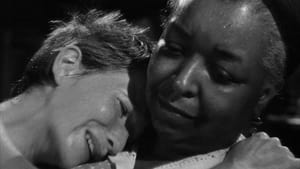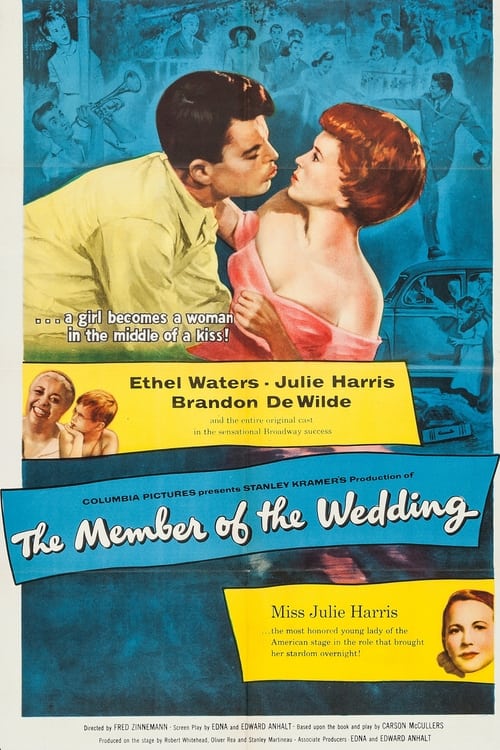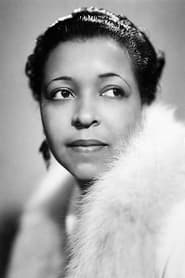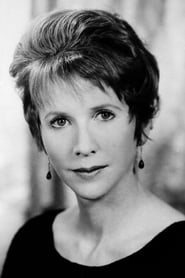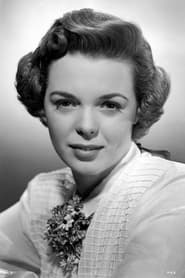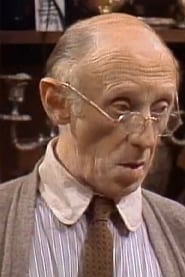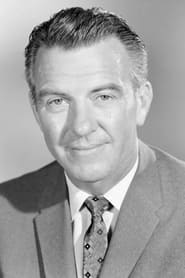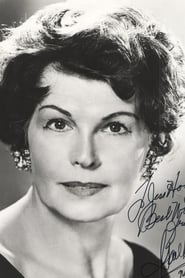Cast
View AllEthel Waters
as Berenice Sadie Brown
Julie Harris
as Frances 'Frankie' Addams
Brandon De Wilde
as John Henry
Arthur Franz
as Jarvis Addams
Nancy Gates
as Janice
William Hansen
as Mr. Addams
James Edwards
as Honey Camden Brown
Harry Bolden
as T.T. Williams
Dickie Moore
as Soldier
Hugh Beaumont
as Minister (uncredited)
Gail Bonney
as Townswoman (uncredited)
Crew
Director
- Fred Zinnemann
Producer
- Stanley Kramer
Reviews
CinemaSerf
"Frankie" (Julie Harris) leads a rather unorthodox life for a twelve year old. As epitomised by their refusal to let her join their club, she is shunned by her more traditional neighbours' children aside from the younger "John-Henry" (Brandon De Wilde). She is largely left to her own devices by her loving but busy dad and it usually falls to their maid "Bernice" (Ethel Waters) to run the house. The fragile peace of the household is a bit shattered when her soldier brother "Jarvie" (Arthur Franz) announces his impending marriage. Somehow, "Frankie" gets it into her head that this could be her opportunity to join the couple and escape the drudgery of her life. Of course that's not going to happen - well not if "Jarvie" has anything to do with it. This rejection followed by a tragedy closer to home leaves her with demons to face that will cause her to question her own identity and future. Harris is good as the rogue daughter but it's really Waters who stands out here. She offers many of the traditional characteristics of the surrogate mother figure, but her own role has some nuances to it as it becomes clear that she, too, has issues that she must reconcile - especially as the denouement soon makes it clear that change is looming for her, too. This is quite a poignant film about growing up - regardless of your age, isolation and aspiration and Fred Zinnemann packs quite a bit to think about into this ninety minutes of better than usual family drama. Yes, there is a strong racial element to the story, but this also takes a much broader look at a wider conformity, at womanhood and with strong performances and a strong story makes for a good watch, here.
Nov 24, 2023
Thematic Analysis
As a dramatic work, The Member of the Wedding examines complex human relationships and emotional struggles against the backdrop of a period setting that reflects societal issues of its time. The character development particularly stands out, offering viewers a chance to reflect on their own life journeys.
Director Fred Zinnemann brings their distinctive visual style to this film, continuing their exploration of themes seen in their previous works while adding new elements. Their approach to character development and emotional depth creates a viewing experience that rewards close attention.
Released in 1952, the film exists within a cultural context that now offers viewers historical perspective on the social issues of that era. Its reception demonstrates the diverse reactions to its artistic choices and its place in cinema history.
Did You Know?
- The production of The Member of the Wedding took approximately 5 months from pre-production to final cut.
- The final cut of the film runs for 93 minutes, though the director's initial assembly was reportedly 123 minutes long.
- The musical score contains over 43 unique compositions.
- The film contains approximately 1809 individual shots.
- The screenplay went through 7 major revisions before the final shooting script was approved.
Historical Context
- In 1952, when this film was released:
- The Cold War was intensifying, influencing global politics and culture.
- Rock and roll music was revolutionizing popular culture.
- The film industry was dominated by major studios, with independent cinema still in its early development.
How This Film Stands Out
While The Member of the Wedding shares thematic elements with other films in its genre, it distinguishes itself through its unique approach to storytelling, visual style, and character development.
Unlike Promise at Dawn, which takes a more conventional approach to its subject matter, The Member of the Wedding offers a fresh perspective through its innovative visual language and narrative structure.
While films like Grand Canary and Kiss the Girls explore similar territory, The Member of the Wedding stands apart through its deeper exploration of its central themes and more complex characterization.
This film's unique contribution to cinema lies in its bold artistic choices and willingness to challenge viewer expectations, making it a valuable addition to its genre.
Details
- Release Date: December 25, 1952
- Runtime: 1h 33m
